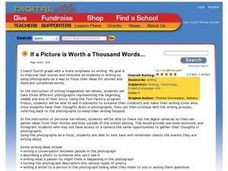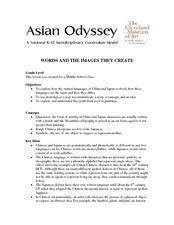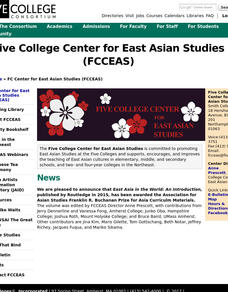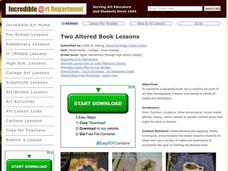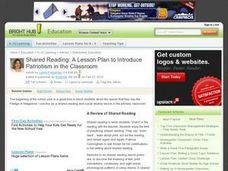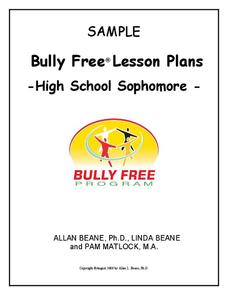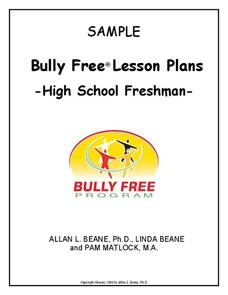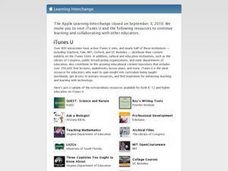Curated OER
Grandparents' Day: Family History
Students explore Grandparents' Day. They interview their grandparents and select an activity to highlight their interview. They select a project including writing an essay, composing a song, creating a poem or scrapbook, or writing a...
Curated OER
Children's March Teacher's Guide, Activity 6
Learners explore the role of gender in the Civil Rights Movement. In this Children's March instructional activity, students watch "Mighty Time: The Children's March" and respond to the provided discussion questions that accompany it....
Curated OER
Dateline: Troy
Students read an abridged version of The Odyssey andl write a composition comparing Odysseus or the Iliad with Odysseus of The Odyssey. Students write a speech that King Priam would make in the attempt to persuade his son, Paris, to...
Curated OER
Long Vowel Phoneme -IGH
Students listen to a poem and discuss the rhyming words. They complete worksheets focusing on the long vowel phoneme -igh.
Curated OER
Dialect Awareness in Literature and Life
Eighth graders realize the impact of dialect in literature as well as their own speaking and writing by reading selections from Frances O'Roark Dowell's novel, Dovey Cove.
Curated OER
If a Picture is Worth a Thousand Words...
Fourth graders take three different photographs representing the beginning, middle and end of their story. They use the Tool Factor program Fresco to add elements to enhance their creativity and make their writing come alive. They then...
Curated OER
Trees, Trees, Trees! - Adopt A Tree
Students adopt a tree, take a bark rubbing from that tree, and conduct research about that type of tree. They write an original piece about their tree using three facts and in a genre of their choice.
Curated OER
Nature Notes
Students spend some time outdoors and record their observations of abiotic conditions, geologic surroundings and living organisms. They reflect and write about the experience of being observant in nature.
Curated OER
Words And the Images They Create
Students explore how the written languages of China and Japan evolved, creating representations of Chinese and Japanese Poetry. Emphasis is placed on small, cooperative learning groups.
Curated OER
A Journey To Africa: Art And Artifacts
Students create a multimedia presentation based on a piece of African Art. They use the art piece to demonstrate the culture and ceremonies of the area in which it was produced. They research facts for a Power Point, write a poem...
Curated OER
Reconciliation
Students develop an awareness of issues involved in Reconciliation. They use two different stimuli to approach this theme. Students write definitions/interpretations of Reconciliation.
Curated OER
Haiku
Students study various forms of poetry and the culture of Japan. They are introduced to a haiku- a traditional form of poetry and an art form in the Japanese culture. They write a haiku and create a student haiku booklet with the classes...
Curated OER
Altered Books
Learners transform a discarded book into a creative art work of art that encompasses a theme and utilizes a variety of media and techniques.
Curated OER
Shared Reading: A Lesson Plan to Introduce Patriotism in the Classroom
Students learn why we say the Pledge of Allegiance through shared reading. In this shared reading lesson plan, students are shown the Pledge of Allegiance in 3 different forms. While they are exploring the pledge, the teacher explains...
Bully Free Systems
Bully Free Lesson Plans—10th Grade
Two lessons, "What Does Cyber Bullying Look Like?" and "Factors Influencing My Reporting the Bullying of Others," serve as examples of the 12 included in a Bully Free curriculum. Each plan includes discussion questions, an activity, and...
Bully Free Systems
Bully Free Lesson Plans—11th Grade
It takes courage to stand up to bullies. Two sample lessons from a complete Bully Free curriculum, "Courageous and Brave Bystanders" and "Assertiveness Skills for Bullied Students and Empowered Bystanders" provide participants with...
Bully Free Systems
Bully Free Lesson Plans—Ninth Grade
"Bullying and Prejudice" and "Do You Cyber Bully," two lessons from a complete Bully Free program, serve as samples of the approach used in a unit designed to bring awareness to and to combat bullying. Each lesson asks class members to...
Curated OER
Author In The Spotlight
Complete an in-depth study of the works or a specific author. Working in pairs, students read at least four works by the same author. After completing the reading, they create an essay comparing and contrasting the works and create an...
Curated OER
Reflections on the Self - Self Portrait
Students produce their own self-portraits and use them to create a book in iPhoto. They explore the visual symbols used by artists to communicate their feelings, interests, and identity.
Curated OER
Note Taking
Third graders get ready to take notes on a field trip. In this notetaking lesson, 3rd graders take notes to remember what they've seen on a field trip. Students draw and analyze diagrams of what they have seen. Students access their...
Curated OER
Baseball Statistics
Students read "Casey at the Bat" and then use individual player statistics (found through internet research)to determine if their players could be considered baseball "heroes". They must justify their choices for "hero" by creating...
Curated OER
Looking at Life through the Creation of Personal Metaphors
Young scholars focus on the creation of personal metaphors, which are first illustrated in pictures and caricatures and then extended to descriptive/analytical paragraphs. They teach the lesson to others using their own personal...
Curated OER
Exploring Photographs, Lesson 2—A Closer Look: Analysis in the Museum
Students explore photographic works of art. In this visual arts instructional activity, students analyze selected photographs by Garcia, Ray, and Eggleston. Students take their own photographs in the style of these photographers.
Curated OER
Author’s Purpose Activity
In this author's purpose worksheet, students read a few sentences about a book and then answer short answer questions about the author's purpose. Students complete 12 questions.







